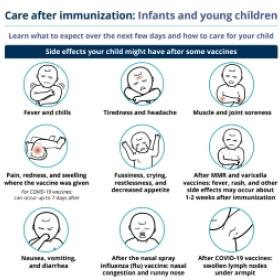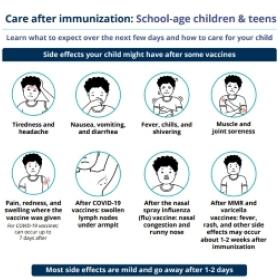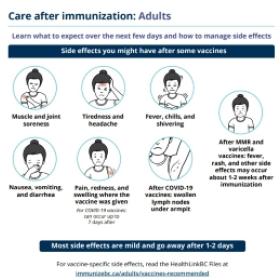On March 31, the ImmunizeBC website will move over to HealthLinkBC.ca After this date, you will be automatically redirected to HealthLink BC’s Immunization landing page. HealthLink BC provides trusted health information online and over the phone 24 hours a day, seven days a week by calling 8-1-1.
Date last reviewed:
Thursday, Dec 05, 2024
On this page:
- Common vaccine side effects
- Rare but serious side effects
- Vaccine-specific side effects
- Immunization aftercare
- Monitoring and reporting adverse events
- Vaccines and other conditions
- It's much safer to get the vaccine than the disease
- Can you get the disease from the vaccine?
- Canada's Vaccine Injury Support Program
Information
Key points
- Vaccines in Canada are very safe. They are among the safest medical products available.
- Vaccine side effects are usually mild (like a sore arm or mild fever) and go away in a few days. Serious side effects are very rare.
- Vaccines are much safer than the diseases they prevent. These diseases can cause severe illness or even be life-threatening.
- There is no evidence that vaccines cause conditions like autism, asthma, sudden infant death syndrome (SIDS), or autoimmune diseases like diabetes and multiple sclerosis.
Because vaccines are given to healthy people, including children, they must meet very high safety standards—often stricter than those for most medications used to treat health conditions.
Common vaccine side effects
Like any medication, vaccines can cause side effects. Most side effects are mild, and many people don’t experience any at all.
Common side effects of many vaccines include:
- Pain, swelling, or redness where the vaccine was given
- Mild fever
- Chills
- Feeling tired
- Headache
- Muscle and joint aches
Most of these side effects are a sign that your body is starting to build immunity (protection) against a disease.
Children may also be fussier than usual after getting vaccinated.
Fainting can happen after any medical procedure, including vaccinations. It’s a reaction to the injection itself, not to any specific vaccine ingredient. If you’re anxious, afraid of needles, or have fainted before, let your health care provider know so they can help keep you safe from falls.
In infants and young children, a high fever can occur, especially after the first dose of a vaccine. In some cases, a fever may lead to a febrile seizure. While this can be alarming, febrile seizures are not harmful and usually stop on their own. They can also happen with any illness that causes a fever, such as a cold, the flu, or an ear infection.
Information
Have a positive experience.
Find tips to help reduce pain and anxiety with immunization in children & teens and adults.
Rare but serious side effects
Serious side effects from vaccines are extremely rare. For example, for every 1 million doses of a vaccine, about 1 person may have a severe allergic reaction called anaphylaxis. Anaphylaxis is preventable in many cases and treatable in all.
Symptoms of anaphylaxis may include:
- Hives
- Trouble breathing
- Swelling of the throat, tongue, or lips
Anaphylaxis usually occurs within minutes of receiving a vaccine, which is why it’s important to stay at the clinic for 15 minutes after getting vaccinated.
If left untreated, anaphylaxis can become life-threatening. If you or your child show signs of anaphylaxis after leaving the clinic, call 9-1-1 or your local emergency number immediately.
While anaphylaxis after vaccination is extremely rare, treatment for it happens more often—about 1 in 100,000 doses. This is because some people may have milder allergic reactions or symptoms that look like early signs of anaphylaxis. If a health care provider is concerned, they may give epinephrine (adrenaline) right away because quick treatment is important. Most of these cases turn out to be due to milder allergies or other causes, like anxiety.
If someone has a reaction that seems like anaphylaxis after a vaccination, they are usually referred to an allergist to see if they can receive that vaccine again.
It’s important to remember that anaphylaxis after vaccination is very rare. More common causes of anaphylaxis include food allergies, medications (like antibiotics), and insect stings or bites.
Vaccine-specific side effects
For information on side effects of specific vaccines, please visit the vaccine pages. Your health care provider will also discuss the potential side effects with you before vaccination, including common mild side effects and rare, serious ones.
Immunization aftercare
Immunization aftercare sheets provide information on what to expect after vaccination, including potential side effects and how to care for yourself or your child. Click the images below to learn more about what to expect after immunization, how to manage side effects, and when to seek medical attention.
Monitoring and reporting adverse events
What is an adverse event?
An adverse event following immunization (AEFI) is an unwanted or unexpected health event that occurs after someone receives a vaccine. This event may or may not have been caused by the vaccine.
Reporting adverse events
It's important to report any adverse events following immunization to your immunization provider, clinic, or health care provider. They will then report these events through the proper channels to help monitor vaccine safety.
Even if you’re not sure whether the vaccine caused the issue, reporting it is important. This helps ensure that potential safety concerns can be investigated, and action can be taken if needed.
Most people who experience an adverse event after vaccination can safely receive vaccines again. Your healthcare provider will advise you on what’s best for you or your child.
Reporting adverse events is a key part of Canada’s vaccine safety monitoring program. For more information on reporting adverse events and vaccine safety, please visit the Vaccine development, approval, & safety monitoring page.
Vaccines and other conditions
Some people have wondered whether vaccines can cause conditions such as autism, asthma, sudden infant death syndrome (SIDS), or autoimmune diseases like diabetes and multiple sclerosis. However, numerous studies have been conducted to address these questions, and there is no evidence linking vaccines to these conditions.
Vaccine safety is carefully tested during clinical trials before vaccines are approved, and it continues to be monitored as millions of doses are given. Vaccines have been closely monitored for over 50 years, and the risk of them causing long-term health problems is extremely low.
Information
Learn more
Read the 2021 U.S report on the safety of routine childhood vaccines: Safety of Vaccines Used for Routine Immunization in the United States: An Update (2021).
Explore the Institute of Medicine’s report on vaccine adverse effects: Adverse Effects of Vaccines Evidence and Causality (2012).
Visit the Vaccine Education Centre at the Children's Hospital of Philadelphia for detailed information on vaccines and other conditions, including links to relevant studies.
It's much safer to get the vaccine than the disease
It's important to remember that getting vaccinated is much safer than getting the diseases vaccines prevent. The complications from these diseases can be serious and even life-threatening.
Some examples:
- Chickenpox (varicella) can cause pneumonia (lung infection), encephalitis (swelling of the brain) and bacterial skin infections.
- Polio can cause permanent paralysis (when you can't move some or all of your body).
- Measles can cause encephalitis (swelling of the brain).
- Mumps can cause deafness (loss of hearing).
- Haemophilus influenzae type b (Hib) can cause brain damage or death.
- Rotavirus can cause severe vomiting and diarrhea, which can result in dehydration and hospitalization.
- Shingles can cause pneumonia (an infection of the lungs), loss of hearing or vision, scarring, nerve pain, and encephalitis (swelling of the brain).
Can you get the disease from the vaccine?
Most vaccines are made from inactivated (killed) versions of the virus or bacteria or from pieces of the virus or bacteria, such as proteins or sugars. These vaccines do not contain live viruses or bacteria and cannot cause the disease.
mRNA vaccines, such as some COVID-19 vaccines, also do not contain live viruses or bacteria and cannot cause disease.
Some vaccines, such as those for measles, mumps, rubella, and chickenpox, contain weakened (attenuated) forms of the virus. These are called live vaccines. Live vaccines do not cause disease in people with healthy immune systems because the virus is too weak to cause illness. However, live vaccines may not be recommended for people with weakened immune systems because there is a risk they could cause the disease in these individuals.
Canada's Vaccine Injury Support Program
In the very rare event that a vaccine causes a serious or permanent injury, the Government of Canada is committed to providing support. The Vaccine Injury Support Program (VISP) offers financial support if it’s determined that someone experienced a serious and permanent injury after receiving a Health Canada-approved vaccine in Canada, starting from December 8, 2020. This includes all vaccines approved by Health Canada, as well as emergency use authorization vaccines like the COVID-19 vaccine. Financial support is also available for the dependents of someone who has passed away after vaccination.


